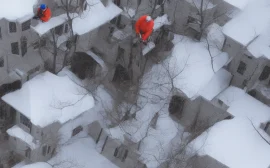Introduction: Protecting Your Phoenix Home Under the Arizona Sun
Phoenix, Arizona, a city renowned for its scorching summers and intense monsoon seasons, presents unique challenges to homeowners, particularly when it comes to maintaining their roofs. The relentless sun, coupled with sudden downpours and high winds, can wreak havoc on roofing materials, leading to premature wear and costly repairs. This guide provides Phoenix homeowners with the knowledge and skills necessary to tackle minor Phoenix roof repair DIY projects, understand when a full roof replacement Phoenix is necessary, and make informed decisions about Arizona roofing materials and contractors.
We’ll delve into the impact of the Arizona climate, explore suitable materials, outline safety precautions, navigate Phoenix roofing permits processes, and analyze the cost-effectiveness of DIY versus professional services. Ignoring these factors can lead to significant property damage and decreased home value. This article will equip you with the information needed to protect your investment and ensure your home remains safe and secure, even under the harshest desert conditions. Understanding the unique stresses placed on roofs in the Phoenix area is paramount for any homeowner contemplating DIY roof repair or a larger Arizona roofing project.
The intense UV radiation degrades even the most robust materials over time, necessitating regular inspections and preventative maintenance. Furthermore, the rapid temperature fluctuations, often exceeding 40 degrees Fahrenheit in a single day, cause expansion and contraction that can weaken seals and create vulnerabilities. Monsoon roof damage is a significant concern, with torrential rains and high winds capable of dislodging shingles, tiles, and even compromising the underlying roof structure. Proactive measures, such as regular debris removal and prompt attention to minor leaks, can significantly extend the lifespan of your roof and prevent costly repairs down the line.
Selecting heat resistant roofing Phoenix solutions is a critical investment for homeowners seeking to mitigate the damaging effects of the desert climate. While asphalt shingles remain a common choice due to their affordability, exploring alternative Arizona roofing materials like tile, concrete, or even metal roofing can provide superior longevity and energy efficiency. Tile roofing, for instance, offers excellent heat resistance and can last for decades with proper maintenance, making it a popular choice in upscale Phoenix neighborhoods.
Metal roofing, while initially more expensive, reflects a significant portion of the sun’s rays, reducing cooling costs and increasing the overall energy efficiency of the home. When considering Phoenix home repair options, prioritizing materials that withstand the extreme climate will ultimately save money and increase property value. Navigating the complexities of roof repair Phoenix often involves understanding local regulations and permitting requirements. Before undertaking any significant DIY roof repair or roof replacement Phoenix project, it’s essential to check with the City of Phoenix’s planning and development department to determine if a permit is required. These permits ensure that all work meets safety standards and building codes, protecting both the homeowner and the community. While some minor repairs may not require a permit, larger projects involving structural changes or significant material replacement typically do. Failing to obtain the necessary permits can result in fines, delays, and even the need to redo the work, highlighting the importance of thorough research and compliance with local regulations before commencing any roofing project.
Arizona’s Climate: A Roofing Material’s Worst Enemy
The extreme heat and monsoon season in Phoenix significantly impact roofing materials. Asphalt shingles, the most common roofing material, can become brittle and crack under prolonged exposure to the sun’s UV rays. The intense heat bakes the shingles, causing them to lose their flexibility and protective granules. This degradation accelerates the aging process and reduces the roof’s lifespan. Monsoon season brings torrential rains and strong winds, which can further damage weakened shingles, leading to leaks and water damage.
Flat roofs, common in some Phoenix architectural styles, are particularly vulnerable to ponding water, which can seep through cracks and cause structural damage. Tile roofs, while more durable, can still suffer from cracked or dislodged tiles due to thermal expansion and contraction. Metal roofs, known for their longevity, can expand and contract significantly with temperature fluctuations, potentially loosening fasteners and creating opportunities for leaks. Recognizing these climate-specific challenges is the first step in choosing the right roofing materials and implementing effective maintenance strategies.
Signs of roof damage specific to Phoenix weather patterns include: excessive granule loss from asphalt shingles, leading to a faded or bare appearance; cracked or warped shingles; water stains on ceilings or walls, indicating leaks; and sagging roof sections, suggesting structural damage. Phoenix roof repair DIY projects often become necessary sooner than in other climates due to the accelerated wear and tear. A study by the Arizona Roofing Contractors Association indicates that roofs in Phoenix may require repair or replacement 20-30% more frequently than roofs in milder climates.
This increased frequency underscores the importance of selecting Arizona roofing materials specifically engineered to withstand the region’s harsh conditions. Homeowners considering DIY roof repair should carefully assess the extent of the damage and their own skill level, as improper repairs can exacerbate existing problems and lead to more costly issues down the line. Obtaining Phoenix roofing permits is also crucial for ensuring compliance with local building codes, even for seemingly minor repairs. Beyond material selection, understanding the nuances of monsoon roof damage is critical for Phoenix homeowners.
The sheer volume of rainfall during monsoon season can overwhelm even well-maintained roofing systems if preventative measures aren’t in place. Regularly inspecting and cleaning gutters and downspouts is essential to ensure proper drainage and prevent water from backing up onto the roof. Furthermore, sealing any cracks or gaps in the roofing material can help prevent water intrusion and minimize the risk of leaks. For those considering roof replacement Phoenix, investing in heat resistant roofing Phoenix solutions, such as tile or coated metal, can significantly extend the lifespan of the roof and reduce long-term maintenance costs.
Consulting with a qualified Phoenix home repair contractor can provide valuable insights into the best roofing options for a specific property and budget. Moreover, the impact of solar radiation on Arizona roofing cannot be overstated. The intense UV rays not only degrade roofing materials but also contribute to increased energy consumption. Darker colored roofs absorb more heat, leading to higher air conditioning bills. Opting for lighter colored or reflective roofing materials can help mitigate this effect and improve energy efficiency. Some advanced roofing systems even incorporate solar reflective coatings that can significantly reduce heat absorption and lower cooling costs. Understanding these energy-related considerations is an integral part of making informed decisions about roof repair Phoenix and roof replacement Phoenix, contributing to both the longevity of the roof and the overall energy efficiency of the home.
Best Roofing Materials for Phoenix: Longevity and Energy Efficiency
Selecting the right roofing materials is crucial for longevity and energy efficiency in Phoenix. While cost is a factor, prioritizing durability and heat resistance will save money in the long run. Here are some of the best materials for the Phoenix climate: Tile Roofing: Clay or concrete tiles are highly durable and resistant to heat, fire, and wind. They also offer excellent insulation, helping to keep your home cooler in the summer. Tile roofs can last for 50 years or more with proper maintenance.
Metal Roofing: Metal roofs, particularly those made from aluminum or steel with a reflective coating, are highly energy-efficient, reflecting solar radiation and reducing heat gain. They are also durable and can withstand high winds and hail. Metal roofs can last for 40-70 years. Asphalt Shingles (Premium): While standard asphalt shingles are less durable, premium asphalt shingles with enhanced UV protection and impact resistance can provide decent performance in the Phoenix climate. Look for shingles with a Class 4 impact rating and a long-term warranty.
Cool Roof Coatings: Applying a reflective coating to an existing roof can significantly reduce its surface temperature and improve energy efficiency. These coatings are available for various roofing materials, including asphalt, metal, and concrete. When choosing Arizona roofing materials for Phoenix home repair, consider the following factors: Longevity: How long will the material last in the Phoenix climate? Energy Efficiency: How well does the material reflect solar radiation and insulate your home? Cost: What is the initial cost of the material and the long-term maintenance costs?
Aesthetics: Does the material complement the style of your home? Fire Resistance: Is the material fire-resistant, which is particularly important in areas prone to wildfires? Beyond these core considerations, understanding the specific challenges posed by Phoenix’s monsoon season is vital. According to the Arizona Roofing Contractors Association, proper installation and flashing are paramount to prevent monsoon roof damage, regardless of the material chosen. “We consistently see issues arise not from material failure, but from improper installation techniques that fail to account for the intense rainfall and wind-driven water common during monsoons,” notes local roofing expert, Ken Johnson, owner of Johnson Roofing in Phoenix.
He emphasizes that even the most heat resistant roofing Phoenix options require meticulous attention to detail during installation to prevent leaks and water damage. Furthermore, when evaluating Arizona roofing materials, homeowners should consider the long-term return on investment, especially in the context of Phoenix real estate. While premium materials may have a higher upfront cost, their extended lifespan and energy-saving properties can significantly increase a home’s value and reduce long-term expenses. For instance, a metal roof, while more expensive initially than asphalt shingles, can potentially lower energy bills by up to 25%, according to the Cool Roof Rating Council.
This translates to substantial savings over the roof’s lifespan and makes the home more attractive to potential buyers. Always factor in Phoenix roofing permits requirements when budgeting for a roof replacement Phoenix project, as these can add to the overall cost. For those considering Phoenix roof repair DIY, it’s crucial to honestly assess your skill level and the complexity of the repair. While minor repairs like replacing a few damaged shingles might be manageable for experienced DIYers, larger projects or those involving structural damage are best left to professionals. Remember that improper DIY roof repair can lead to further damage, void warranties, and even create safety hazards. Before undertaking any DIY roof repair, familiarize yourself with local Phoenix roofing permits requirements and always prioritize safety. If unsure, obtaining quotes from reputable roof repair Phoenix contractors is a wise investment to ensure the job is done correctly and safely.
Safety First: Working on Roofs in Extreme Heat and Navigating Phoenix Permits
Working on a roof in Phoenix’s hot weather demands strict adherence to safety precautions. Heatstroke and falls are significant risks, especially given the intensity of the Arizona sun. To mitigate these dangers during any Phoenix roof repair DIY project, prioritize working during cooler hours, ideally before 8 am or after 6 pm. Avoid the peak heat hours between 10 am and 4 pm. Staying hydrated is equally critical; consume water consistently throughout the day, avoiding sugary drinks that can exacerbate dehydration.
Wearing light-colored, loose-fitting clothing, a wide-brimmed hat, and sunglasses will further protect you from the sun’s harmful rays. Remember to apply a high SPF sunscreen liberally and reapply every two hours, particularly if sweating heavily, a common occurrence during Arizona roofing work. Beyond basic precautions, implementing robust safety measures is essential for any roof repair Phoenix or roof replacement Phoenix endeavor. Always wear a safety harness and lifeline attached to a secure anchor point to prevent falls.
Non-slip shoes with excellent traction are also crucial for maintaining a firm grip on the roof surface. Take frequent, scheduled breaks in a shaded area to allow your body to cool down and recover. Having a spotter present who can monitor your condition and provide immediate assistance in case of an emergency is highly recommended. Be acutely aware of the signs of heatstroke, such as headache, dizziness, nausea, and confusion; if any of these symptoms arise, cease work immediately and seek medical attention.
Before ascending, thoroughly inspect your ladder to ensure it is stable, in good condition, and properly secured. Clear communication with someone about your work schedule and expected completion time is also a vital safety step. Navigating Phoenix roofing permits is a crucial aspect of responsible Phoenix home repair. While minor repairs, such as replacing a few damaged Arizona roofing materials, might not necessitate a permit, more extensive projects invariably do. Specifically, any roof replacement Phoenix or significant repair work typically requires a permit from the City of Phoenix Planning & Development Department.
This ensures compliance with local building codes and safety standards, safeguarding both the homeowner and the community. Before commencing any roof work, always verify the permitting requirements with the city’s permitting office to avoid potential fines or legal complications. Ignoring these regulations can lead to costly delays and necessitate rework, ultimately impacting the overall budget and timeline of your Phoenix roof repair DIY or professionally managed project. Understanding the nuances of Phoenix roofing permits is an integral part of responsible homeownership in the Valley of the Sun, especially when dealing with monsoon roof damage and ensuring the longevity of your heat resistant roofing Phoenix.
DIY vs. Professional Roofing: Cost Analysis and Local Resources
Deciding between DIY roof repair and hiring professional roofing services in Phoenix involves a careful cost analysis, a critical consideration for any homeowner in the Phoenix real estate market. DIY repairs can initially appear to save money on labor costs, but they demand a significant investment of time, specialized skills, and the acquisition or rental of appropriate tools. Furthermore, underestimating the complexities of Phoenix roof repair DIY can lead to costly and potentially dangerous mistakes, ultimately diminishing the value of your home improvement efforts.
Professional roofing services, on the other hand, offer expertise, experience dealing with Arizona roofing materials, and crucial insurance coverage, protecting you from liability in case of accidents or property damage, a significant advantage given the risks associated with working at heights, especially during the intense Phoenix heat. Here’s a detailed breakdown of the cost considerations for both approaches. For DIY repairs: factor in the cost of shingles suitable for Arizona’s climate, underlayment, flashing designed to withstand monsoon roof damage, nails, and other necessary materials.
Don’t forget the expense of purchasing or renting specialized tools, such as a roofing nailer, ladder, and safety harness. Accurately assess the value of your time spent on the project, considering potential lost wages or leisure time. Most importantly, acknowledge the potential cost of mistakes or injuries, which can far outweigh the initial savings. Professional roofing services entail labor costs, which reflect the expertise and efficiency of experienced contractors. Material costs may be higher than DIY prices due to contractor markups, but this often includes bulk discounts and access to higher-quality Arizona roofing materials.
The cost of the contractor’s liability insurance is a crucial safeguard, and the value of the contractor’s warranty on the work provides long-term peace of mind. In general, DIY roof repair is best suited for minor issues, such as replacing a few damaged shingles or patching a small leak, provided you have the necessary skills and experience. However, major repairs or full roof replacements are best left to professionals who understand the nuances of heat resistant roofing Phoenix and can navigate the complexities of Phoenix roofing permits.
Attempting a large-scale project without proper knowledge can compromise the structural integrity of your roof and potentially decrease your property value. Ignoring permitting requirements can also lead to fines and delays, further impacting your investment in Phoenix home repair. Local resources for roofing materials and information in Phoenix include: The City of Phoenix Planning & Development Department, which provides essential permitting information and building codes. Numerous local roofing supply companies, such as ABC Supply Co., Beacon Building Products, and SRS Distribution, offer a wide range of Arizona roofing materials.
Home improvement stores like The Home Depot and Lowe’s also provide a selection of roofing materials and tools. Online resources, such as websites like Angie’s List and the Better Business Bureau, can assist you in finding reputable roofing contractors in Phoenix. Remember to verify licenses and insurance before hiring any contractor for roof replacement Phoenix or any other significant roof repair Phoenix. Ultimately, maintaining a roof in Phoenix requires diligence, informed decision-making, and a proactive approach. By understanding the impact of the Arizona climate, carefully selecting appropriate materials, prioritizing safety, navigating permitting processes, and thoroughly weighing the costs of DIY versus professional services, homeowners can protect their investment, ensure their homes remain safe and secure, and preserve the value of their Phoenix real estate for years to come. Prioritizing heat resistant roofing Phoenix will also contribute to energy efficiency and lower cooling costs during the intense summer months.



